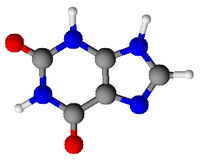C5H4N4O2
- C5H4N4O2
-
Xanthine
| Xanthine |

 |
| Xanthine |
| Général |
| No CAS |
69-89-6 |
| No EINECS |
200-718-6 |
| SMILES |
|
| InChI |
InChI=1/C5H4N4O2/c10-4-2-3(7-1-6-2)8-5(11)9-4/h1H,(H3,6,7,8,9,10,11)
|
| Propriétés chimiques |
| Formule brute |
C5H4N4O2 [Isomères]
|
| Masse molaire |
152,1109 g∙mol-1
C 39,48 %, H 2,65 %, N 36,83 %, O 21,04 %,
|
| pKa |
7.53 [1] |
| Propriétés physiques |
| Solubilité |
69 mg/L (eau, 16 °C) [1] |
| Écotoxicologie |
| DL50 |
500mg/kg (souris, i.p.) [1] |
|
Unités du SI & CNTP, sauf indication contraire.
|
La xanthine est une substance issue de la désamination (on enlève un -NH2) des bases puriques (adénine et guanine). Elle est convertie en acide urique par l'action de la xanthine oxydase.
Les méthylxanthines sont communément utilisés comme stimulants légers et pour leurs effets bronchodilatateurs, notamment dans le traitement de l'asthme. Ils ne sont pas considerés comme alcaloïdes car ils ne possèdent pas d'azote basique dans leur structure. La caféine, la théophylline, la théobromine font partie de ce groupe.
Voir aussi
Notes et références
 Portail de la chimie
Portail de la chimie Portail de la pharmacie
Portail de la pharmacie
Wikimedia Foundation.
2010.
Contenu soumis à la licence CC-BY-SA. Source : Article C5H4N4O2 de Wikipédia en français (auteurs)
Regardez d'autres dictionnaires:
Xanthine — Not to be confused with xanthene. Xanthine … Wikipedia
Ксантин — I (хим.) C5H4N4O2 находится в минимальном количестве вместе с другими ксантиновыми веществами (параксантином, гипоксантином, гетероксантином) в моче человека и животных, в нефритической моче детей, иногда в мочевых камнях, во многих органах и… … Энциклопедический словарь Ф.А. Брокгауза и И.А. Ефрона
Oxypurinol — Preferred IUPAC name 1,2 Dihydropyrazolo[4,3 e]pyrimidine 4,6 dione … Wikipedia
Псевдоксантин — (хим.) так назвали Шультцен и Филене вещество с составом ксантина C5H4N4O2 (см.), полученное ими рядом с глицином и гидуриловой кислотой при нагревании мочевой кислоты (1 часть) с крепкой серной кислотой (2 части) при 110 130° и представляющее… … Энциклопедический словарь Ф.А. Брокгауза и И.А. Ефрона
69-89-6 — Xanthine Xanthine Xanthine Général … Wikipédia en Français
Xanthine — Général N … Wikipédia en Français
xanthine — noun Etymology: International Scientific Vocabulary Date: 1857 a feebly basic compound C5H4N4O2 that occurs especially in animal or plant tissue, is derived from guanine and hypoxanthine, and yields uric acid on oxidation; also any of various… … New Collegiate Dictionary
Bladder stone (animal) — Bladder stones or uroliths are a common occurrence in animals, especially in domestic animals such as dogs and cats. The stones form in the urinary bladder in varying size and numbers secondary to infection, dietary influences, and genetics.… … Wikipedia
Белковые тела — Б. тела в животном организме играют исключительно важную роль, являясь главной составной частью протоплазмы, тканей, органов и соков. Только пот, желчь, слезы и моча, по видимому, свободны от белков; во всех других частях тела белки, после воды,… … Энциклопедический словарь Ф.А. Брокгауза и И.А. Ефрона
Liste der organischen Verbindungen — Auswahl organischer Verbindungen Inhaltsverzeichnis 1 nach Zahl der Kohlenstoffatome geordnet 1.1 C1 1.2 C2 1.3 C3 1.4 C4 1.5 C5 … Deutsch Wikipedia


